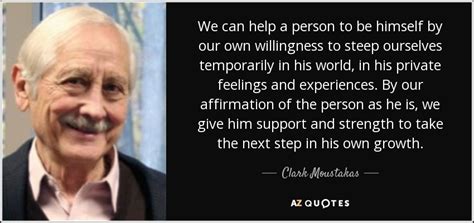A Quote by Maria Montessori
The objects in our system are instead a help to the child himself, he chooses what he wants for his own use, and works with it according to his own needs, tendencies and special interests. In this way, the objects become a means of growth.
Related Quotes
The Lord gave the wonderful promise of the free use of His name with the Father in conjunction with doing His works. The disciple who lives only for Jesus' work and kingdom, for His will and honor, will be given the power to appropriate the promise. Anyone grasping the promise only when he wants something very special for himself will be disappointed, because he is making Jesus the servant of his own comfort. But whoever wants to pray the effective prayer of faith because he needs it for the work of the Master will learn it, because he has made himself the servant of his Lord's interests.
Man never ceases to seek knowledge about the objects of his experiences, to understand their meaning for his existence and to react to them according to his understanding. Finally, out of the sum total of the meanings that he has deduced from his contacts with numerous single objects of his environment there grows a unified view of the world into which he finds himself "thrown" (to use an existentialist term again) and this view is of the third order.
Whenever I hear about a child needing something, I ask myself, 'Is it what he needs or what he wants?' It isn't always easy to distinguish between the two. A child has many real needs which can and should be satisfied. His wants are a bottomless pit. He wants, for example, to sleep with his parents. He needs to be in his own bed. At Christmas he wants every toy advertised on television. He needs only one or two.
With my work I attempt to help man to overcome his alienation; I do this by surrounding his daily life with objects, which confront him in a tactile way with the final and deepest problems of our existence. I want the means that I employ to create the necessary stimulus to be as direct as possible. Instead of giving a sermon on humility, I often prefer to depict humility itself.
There is a man who exists as one of the most popular objects of leadership, legislation, and quasi-literature in the history of all men. . . . This man, that object of attention, attack, and vast activity, cannot make himself be heard, let alone understood. He has never been listened to. . . . That man is Black and alive in white America where the media of communication do not allow the delivery of his own voice, his own desires, his own rage.
Meanwhile, spiritual submissiveness brings about the wiser use of our time, talents, and gifts as compared with our laboring diligently but conditionally to establish our own righteousness instead of the Lord's (D&C 1:16). After all, Lucifer was willing to work very hard, but conditionally in his own way and for his own purposes.
God is beyond definition. But according to one's own vision or receptivity, one will define God in one's own way. Some will say that God is all Love. Others will say that God is all Power. Each one will see God according to his own necessity, his own receptivity and, finally, according to the way God wants him to see the ultimate Truth.
Everyone carries a part of society on his shoulders; no one is relieved of his share of responsibility by others. And no one can find a safe way out for himself if society is sweeping toward destruction. Therefore, everyone, in his own interests, must thrust himself vigorously into the intellectual battle. None can stand aside with unconcern; the interest of everyone hangs on the result. Whether he chooses or not, every man is drawn into the great historical struggle, the decisive battle into which our epoch has plunged us.
With only one life to live we can't afford to live it only for itself. Somehow we must each for himself, find the way in which we can make our individual lives fit into the pattern of all the lives which surround it. We must establish our own relationships to the whole. And each must do it in his own way, using his own talents, relying on his own integrity and strength, climbing his own road to his own summit.
This system in which a child is constantly moving objects with his hands and actively exercising his senses, also takes into account a child's special aptitude for mathematics. When they leave the material, the children very easily reach the point where they wish to write out the operation. They can thus carryout an abstract mental operation and acquire a kind of natural and spontaneous inclination for mental calculations.
His [Henry Cavendish's] Theory of the Universe seems to have been, that it consisted solely of a multitude of objects which could be weighed, numbered, and measured; and the vocation to which he considered himself called was, to weigh, number and measure as many of those objects as his allotted three-score years and ten would permit. This conviction biased all his doings, alike his great scientific enterprises, and the petty details of his daily life.



































